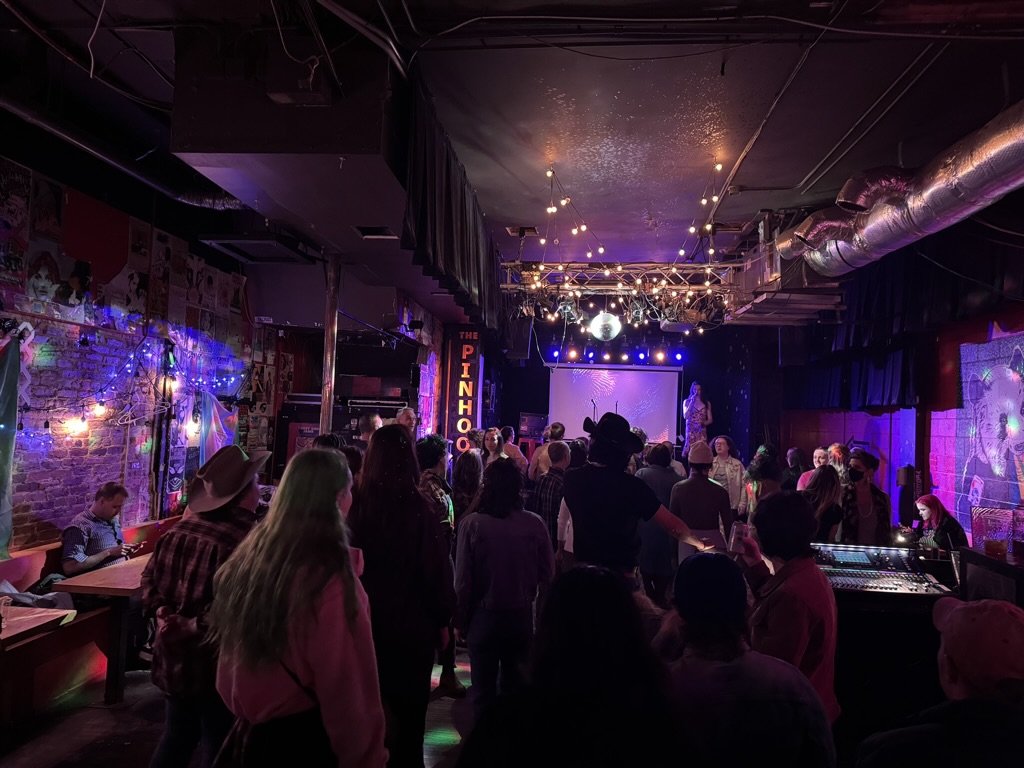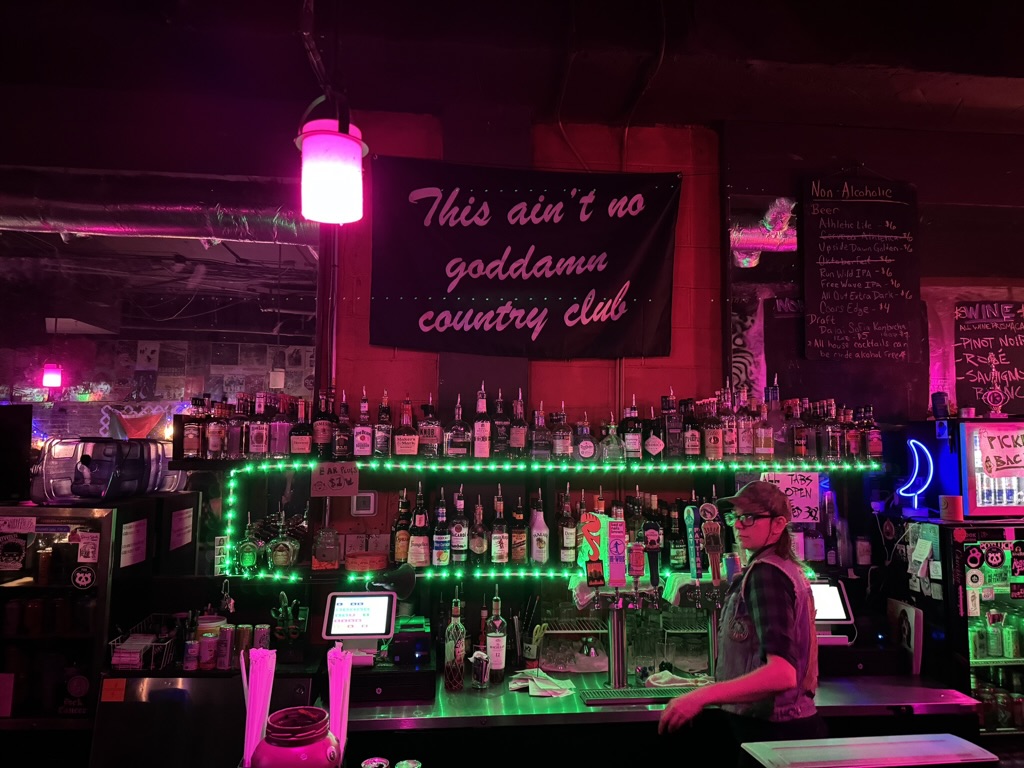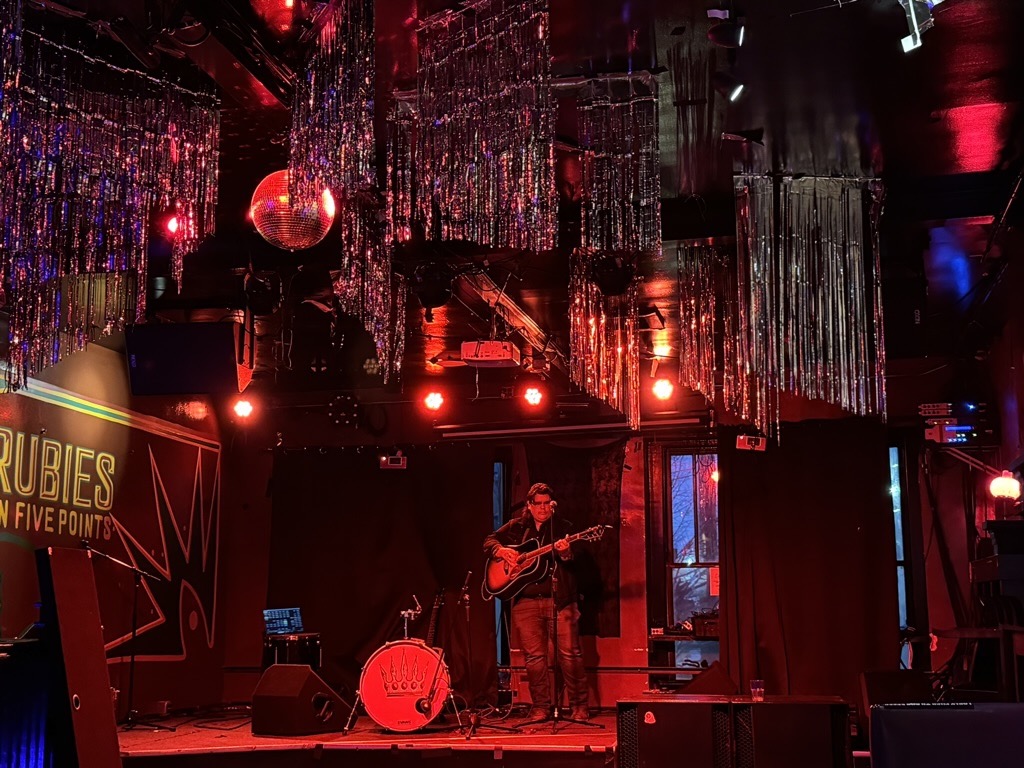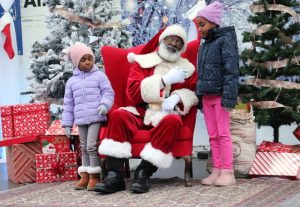On a recent Tuesday night, the Pinhook bar in Durham looked more like a honky-tonk. The venue was dimly lit, but a small disco ball overhead illuminated a jumble of cowboy boots, hats and fringed vests. Over the bar, a flag read, “This ain’t no goddamn country club.”
A pink-haired woman took the stage alone, wearing an oversized graphic tee and fishnet tights tucked neatly into a pair of black cowboy boots. She bent over the mic, belting “Goodbye Earl” by The Chicks — her favorite song. Not once did she glance back at the lyrics displayed on the screen behind her.
This was no ordinary night at the Pinhook, an LGBTQ+ bar better known for its emo aesthetic and drag performances. It was “Queer Cosmic Country Night,” and over 50 patrons packed into the venue for a night of country karaoke and line dancing.
“Welcome to country night! That’s queer as f––– everybody!” shouted Kym Register, a country folk artist who owns the Pinhook, as the line dancing commenced.

LGBTQ+ artists have long pioneered pop music. Yet the country genre — often associated with Red America — has remained rugged terrain, slow to embrace queer artists and themes.
Now, the landscape may be shifting. As queer musicians like Brandy Clark and Orville Peck transform the genre on a national scale, country fans in Durham are taking notice.
“There’s so many emerging queer country artists, which I find very exciting,” said Samantha Schwamberger, a Durham farmworker who attended the bar night with her girlfriend.
Local musicians are also arriving on the scene, finding fans among Durham’s country music listeners and its sizeable LGBTQ+ community.
***
I was raised for a future that was a lie
I could kick myself for wasting so much time
Went and hung my dreams up on the shelf
But they say you can’t love nobody ‘till you love yourself
— From Max Lane’s song “Blank White Pages”
Max Lane was plucked from the church choir for a life of ministry. Now, he writes country music about religious trauma.
Raised in Baton Rouge, Louisiana in an evangelical church, Lane’s musical talent was evident from a young age. Church leaders, recognizing Lane’s musicality, soon put him on the path to become a pastor.
But as Lane grew older, he began to distance himself from the evangelical world. He felt like a “fish out of water” because questioned authority — and because he realized he was bisexual.
“I have spent a very long time reckoning with my sexuality,” he said. “I was extremely repressed and hardcore closeted. I grew up in a community that was very vocally violent towards the gay community. And so when you grow up in those kinds of environments that are so vehement, you’ve learned to push it so far down that even you can’t find it.”
After leaving the church — and severing ties with his family and community — Lane fell into a substance abuse spiral. It wasn’t until 2021, when Lane got sober, that he began reconnecting with his musical roots.
“Everything felt natural,” he said. “I hadn’t felt that synchronicity with music that I had since I was a kid. I finally feel like I found my sound, but also, I felt like I found my voice, my writing style and everything like that.”
Lane, who now lives in Hillsborough, often writes about religious trauma and substance abuse, but he doesn’t discuss his sexuality in his music. While he came out publicly on social media last year, he generally steers clear of the topic altogether.
“Country is a weird space,” Lane said. “There’s a lot of country fans that would not listen to me if they knew. So I’m very selective about who I give that information to.”
“My brand is really more about the music, and I happen to be queer,” he added.
And while Lane’s music sounds different from country music radio (he doesn’t dwell on Ford Trucks or beer), he believes his songs invoke country tradition, mirroring classic artists such as George Strait and Alan Jackson.
“I feel like people are starting to crave authenticity in country music,” he said. “I feel like we’re kind of going forward, but in the way we’re going forward, I feel like we’re kind of going backwards in a good way. We’re going back to the times where people would actually sing about life.”
As a former evangelical, Lane also feels sympathy for people “stuck” in communities that espouse right-wing and Christian nationalist views. He doesn’t want to alienate those listeners, but he hopes to one day help expose them to the LGBTQ+ community.
“It’s hard to get out because if you get out, you lose everyone, and I did,” he said.
“I hope down the line, as I gain more fans and stuff, that I can invite these people that maybe wouldn’t normally have conversations or even listen to people that are queer into a conversation that hopefully helps them out of their own ignorance,” he added.
While Lane seldom writes songs about his sexuality, he’s excited about the emerging queer country scene in Durham. He said he feels most himself when he performs in gay-friendly venues such as the Pinhook or Rubies on Five Points.
“It’d be nice to be able to see the scene grow here to the point where we can really make our own little Nashville — I guess, a more inclusive Nashville,” he said.
***

Well, I ain’t asking for your approval
Of the way that I express my gender
If you don’t like the way I’m dressin’
You can just leave this long-haired country queer alone
— From John Rodney’s song “Long Haired Country Queer”
Other Durham country artists are opting for a different approach, hoping to foster inclusivity by openly discussing queerness in their music.
Take singer John Rodney. The Raleigh native moved to Durham “to try and find some sort of queer community in the South.” His most recent EP, entitled “Songs From the Closet,” includes tracks such as “Long Haired Country Queer” and “Talking Hetero Blues.”
“My music in this EP I’ve released is kind of slanted towards making fun of straight people,” Rodney said. “I wanted to debut with something that was like, ‘Yeah, we’re queer. We know you don’t like it, but you guys are also weird.’”
Durham musician Izzy Ryder similarly likes to push buttons. Originally from Fort Worth, Texas, she once enjoyed performing in small-town Texas, where her audience wasn’t always accepting of the queer community.
“I like to see them squirm in their chairs if they hear me talk about an ex-girlfriend of mine,” she said.
Ryder also views her music as a chance to directly influence listeners’ views about the LGBTQ+ community.
“I do think that as long as the art is prominent, the rest will be accepted slowly by those bigoted demographics,” she said. “The art would convince anybody, just like stand-up comedy, if you pull them in and show them that you’re relatable and human.”
Both artists say they’ve faced backlash online or in different parts of the country. Durham’s country fans, though, seem to be readily embracing the new LGBTQ+ voices in the genre.
“[Durham] really has blossomed into this super-accepting and encouraging community around queerness and around queer music in the last seven, eight years or so,” Rodney said.
Above: Max Lane performs at Rubies on Five Points. Photo by Mia Penner — The 9th Street Journal






